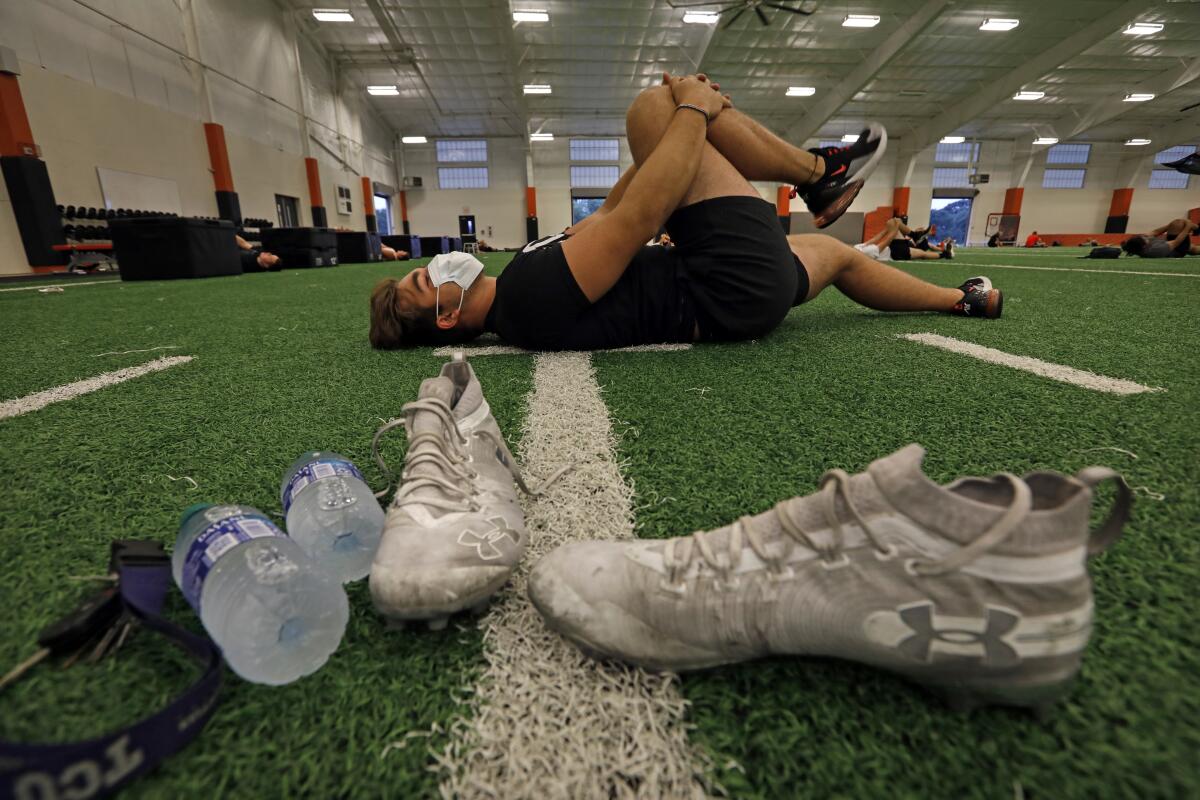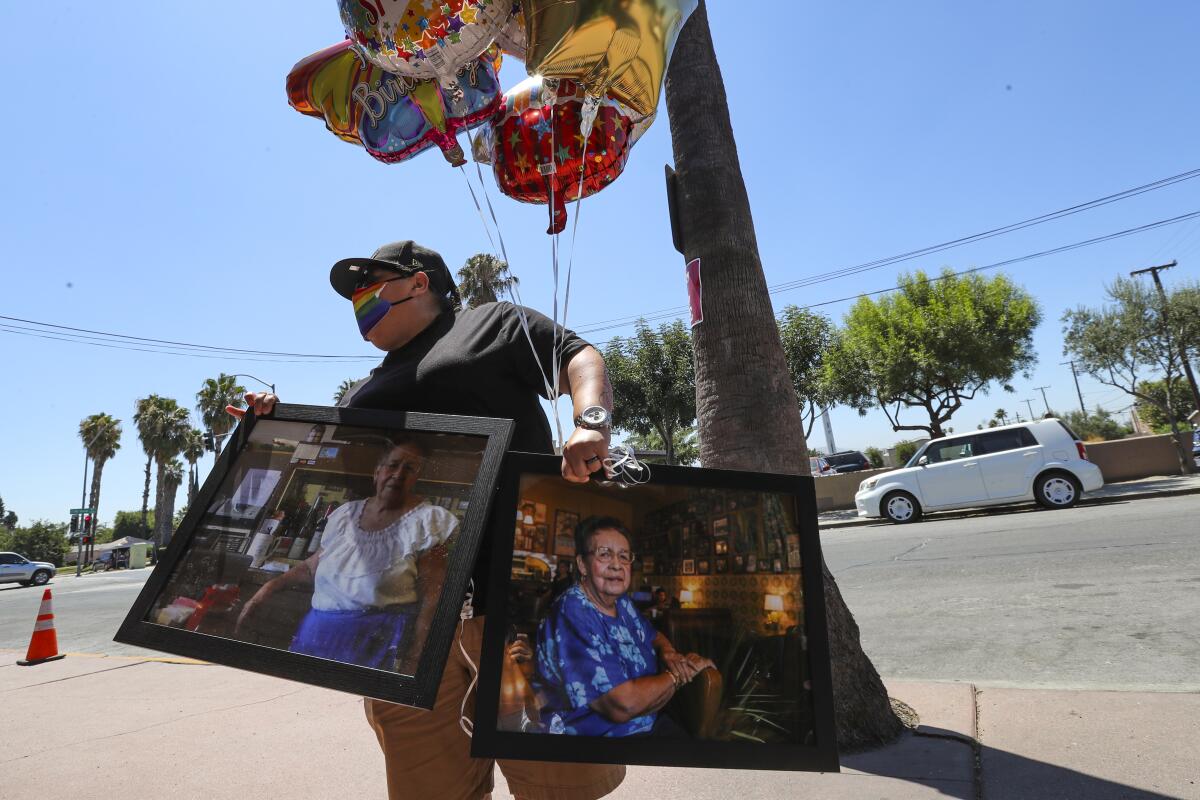Coronavirus Today: Contact tracing’s secret weapon
Good evening. We’re Diya Chacko and Sam Schulz, and it’s Friday, July 31. Here’s the latest on what’s happening with the coronavirus, plus ways to spend your weekend and a look at some of the week’s best stories.
Contact tracing is crucial to ending the pandemic, public health experts agree. Aggressively used, it’s helped countries such as South Korea and Germany contain their outbreaks. But Los Angeles County’s contact tracing system has repeatedly failed to detect workplace outbreaks before they spread widely, a failure that is driving the recent surge in infections.
The county program has been foiled by long waits for test results, language barriers, uncooperative employers and incomplete information from employees who become sick, officials say. Many are low-wage workers who can’t afford to take time off and fear retaliation if they report unsafe conditions. The share of infected people whom tracers have been able to reach has fallen, and only about two-fifths of those reached are willing to say whom else they may have exposed.
That has left L.A. County health officials pleading with businesses and employees to report COVID-19 cases, as they investigate a deadly outbreak at a food processing plant in Commerce.
It’s also prompted them to recruit librarians to serve as contact tracers, since they’re already skilled at being organized, tech-savvy, empathetic and patient in interacting with the public — key to earning patients’ trust. “The reason I volunteered for contact tracing is that it’s really the same thing,” said Lupie Leyva, a manager and librarian at the Robert Louis Stevenson Branch Library in Boyle Heights. “It’s still helping people, it’s helping my community, it’s trying to get my community back to normal so that people will feel comfortable going back into the library.”
Many experts agree that economic life won’t get back to normal until contact tracing dramatically improves and officials gain a better sense of how COVID-19 is spreading. And with some relief benefits drying up, that’s taken on greater urgency.
The $600 weekly federal unemployment subsidy officially expires today, as does a national eviction moratorium on some properties. Democrats and Republicans haven’t reached a deal on an economic aid package meant to deal with the growing surge of COVID-19.
Tens of millions of jobless Americans have been relying on that aid to supplement their state benefits and help pay rent and buy groceries during the crisis. Even with it, almost 30 million Americans didn’t have enough to eat last week, the Census Bureau reported — the most widespread food insecurity since tracking began in May.
In California, where nearly 1 million people are still waiting to collect any unemployment benefits at all, state lawmakers lashed out at a plan from Gov. Gavin Newsom that would take two months to resolve the backlog of claims, warning at an Assembly hearing of constituents’ struggles. People who had lost their jobs described spending months trying in vain to get through the Employment Development Department’s clogged phone lines and overcome glitches to get paid.
Amid all these struggles, the state has now surpassed 500,000 confirmed coronavirus cases, and a teenager in the Central Valley has died of causes related to COVID-19, becoming the state’s first juvenile death from the disease. And in some counties, missteps by corrections officials handling prison releases are fueling fears that thousands of incarcerated people now eligible for release could spread the virus in their communities.
By the numbers
California cases and deaths as of 4:06 p.m. PDT Friday:

Track the latest numbers and how they break down in California with our graphics.
What to read this weekend
The Times is remembering the lives COVID-19 has taken. One of them was Leland “Hobo” Goodsell, a homeless man who lived on the streets of Goleta with his dog, Dreamer. Goodsell was friendly with a sharp sense of humor and a twinkle in his eye. He “had a way of lightening everything up with his jokes,” said his friend.
In documenting the stories of Californians like Goodsell for its ongoing tribute, The Times has spoken with hundreds of survivors about their loved ones’ lives. You can read their stories online and in a special section of today’s print edition. As a whole, the tributes tell the stories of ordinary people with ordinary lives who are remembered most for the extraordinary things, large and small, they did for others.
What if Mecca could be brought to Muslims? This year’s hajj has been drastically scaled back, with Saudi Arabia implementing extraordinary safety measures to curb the spread of the coronavirus. So some app developers are trying to give worshipers a virtual way to experience the pilgrimage the pandemic has denied them.
“Man cannot win against nature.” As China wrestles with the effects of the pandemic, catastrophic flooding has destroyed thousands of homes and is straining its gargantuan dams, many built in the 1950s and ’60s and poorly maintained. Adding yet another layer of social inequities wrought by the coronavirus is the choice of where to let waters out — and whom to flood.

“I’m used to being in front of thousands of people.” Writers can write, painters can paint, composers can compose. But when a pandemic shuts down all the sets and stages in America, what’s an actor to do? Here’s how Emmy nominees Uzo Aduba, Ann Dowd and other performers are staying creative during COVID-19.
Will the coronavirus dim the Friday night lights of Texas high school football? Face masks, social distancing and temperature checks are changing — and perhaps endangering — the hallowed rhythms of Texas football. “I’ll be there front and center with my mask on,” said a mother of two players. “We can’t let this COVID stop us.”

Your support helps us deliver the news that matters most.
What to do this weekend
Get gardening. Find some inspiration from this Pomona farmer who’s turning suburban lawns into fruit orchards and vegetable farms. He offers some thoughts on what gardening can bring us right now and some tips for beginners.
Get takeout comfort food from a Times-honored restaurant. The Times has named Orsa & Winston its restaurant of the year for “the delicious ways it reflects the cultural mosaics of our city” and given Post & Beam the Gold Award, calling it “an essential Southern California experience.” Or if you’re up for turning on the oven, why not make cake for breakfast, specifically one full of peaches and plums?
Get outside. Venture beyond your neighborhood for one of these 57 L.A. walks to get in your 10,000 steps. Eager to hit the trail or the beach? Here’s the latest on what’s open and what’s closed from Christopher Reynolds and Mary Forgione. You can sign up for her newsletter The Wild for more.
Watch something great. Our picks for weekend culture include a “Hamilton” cast reunion to fight racism, a virtual dance festival, a star-studded Tennessee Williams celebration and the annual Broadway Bares burlesque show. And among the new movies Mark Olsen rounds up in his Indie Focus newsletter is a film of redemption and recovery that might have some unexpected parallels with the pandemic.
Watch something that indulges your ’80s and ’90s nostalgia. “The Go-Gos” is the kind of catchy, layered documentary every ’80s icon deserves, Noel Murray writes. And ’90s gem “Clueless,” the winner of this week’s Ultimate Summer Movie Showdown, hasn’t aged a day, with its wit, charm and one-liner-studded script, Times film critic Justin Chang and TV reporter Yvonne Villarreal say. Chang also talked with its director about its enduring appeal.
Listen to a podcast. Try “Coronavirus in California” for dispatches from the front lines. For stories from beyond the crisis, check out our podcast “It Was Simple: The Betty Broderick Murders,” written and hosted by columnist Patt Morrison. Here are more great podcasts, too.
Resources
— For general safety, wash your hands for at least 20 seconds (here’s a super-fun how-to video). Stop touching your face, and keep your phone clean. Practice social distancing, maintaining a six-foot radius of personal space in public. And wear a mask if you leave home. Here’s how to do it right.
— Watch for symptoms including fever, cough, shortness of breath, chills, repeated shaking with chills, muscle pain, headache, sore throat and loss of taste or smell. If you’re worried you might be infected, call your doctor or urgent care clinic before going there.
— Need a COVID-19 test? Here’s how to receive a free test if you’re in L.A. County. And here’s a map of testing sites across California.
— Here’s how to care for someone with COVID-19, from monitoring their symptoms to preventing the virus’ spread.
— If your job has been affected by the pandemic, here’s how to file for unemployment.
— Here are some free resources for restaurant workers and entertainment industry professionals having trouble making ends meet.
— Advice for helping kids navigate pandemic life includes being honest about uncertainties, acknowledging their feelings and sticking to a routine. Here’s guidance from the CDC.
— In need of mental health services? Here are resources for coping during the crisis from the CDC and the L.A. County Department of Mental Health. L.A. County residents can also call (800) 854-7771 or text “LA” to 741741.
— Tempted to go out now that the economy is reopening? Here’s how you can assess your risk.The pandemic in pictures

Denise Vara helps give legendary waitress Lucy Reyes a COVID-19-safe memorial, with tacos to go. Reyes, who died of a heart attack this month, worked at Mitla Cafe, the oldest Mexican restaurant in the Inland Empire, for 68 of its 83 years. On a blistering Saturday morning, customers shared stories of Reyes at a socially distanced memorial in the Mitla parking lot. “She embodied the spirit of San Bernardino,” said the restaurant’s co-owner.
Got a question? Our reporters covering the coronavirus outbreak want to hear from you. Email us your questions, and we’ll do our best to answer them. You can find more answers in our Frequently Asked Questions roundup and in our reopening tracker.
For the most up-to-date coronavirus coverage from The Times over the weekend, visit our homepage and our Health section, listen to our “Coronavirus in California” podcast, sign up for our breaking news alerts, and follow us on Twitter and on Instagram.





